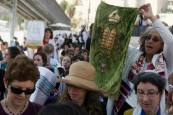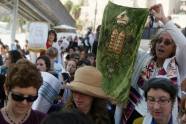In this blog dialogue, Rabbis Elyse Goldstein of City Shul and Ed Elkin of the First Narayever Congregation, friends and colleagues in downtown Toronto, converse on matters of contemporary Jewish import. We publish everytime the spirit moves us, or when you send us a hot-button question. Readers are welcome to submit suggestions for future topics in the comments below.

Hi Ed,
Rosh Hashana and Yom Kippur services. I imagine how it feels to shul regulars: a fashion-show of strangers, preening, talking, walking in and out, coming late, leaving early. It’s a bad theatre scene— with people exiting before or even during the final act. It’s a concert gone wrong— with fans singing their hearts out while the others don’t know the songs, weren’t there when the band first formed, and don’t understand the lyrics.
And I also imagine how it feels to those who come only for those days: they’ve entered an alien world where everyone stands up and sits down as if on cue. It’s a three-hour Italian opera with no subtitles, no programmes and no plot. It’s a parade of people who all seem to know each other pecking on the cheeks, saving seats, and sharing inside jokes.
How does it feel up front, from the Rabbi’s perspective?
My one chance to make a difference in one person’s life because of one thing I’ve said or not said.
My last chance to pitch the programs and causes I believe in to a large audience.
A crap-shoot of weather, location, who sits in the first five rows, and who isn’t in conflict with their spouse, their kids, or me because of what I spoke about last year.
Raw. Tense. Awkward. Expectant. Hopeful. Excited. New.
Then I calm down and look out, and honestly, I feel emotionally overwhelmed before the first note hits. Because all I can see are Jews who could be anywhere else in the world on this day, but have chosen to be in my shul on the holidays. All I can see is the list of things they could have said but didn’t: It’s nice out- hey, let’s go to their cottage. It’s rainy out- hey, why not just stay home and make brownies? It’s along weekend—fall foliage tour! It’s a weekday—no traffic on the 400 north! We’re intermarried—why bother? We don’t have kids at home—this is for families. We have little kids—we’ll be chasing them all over the sanctuary. We’re university students—this is for old folks. We’re seniors—this is for young people. I see those bubbles over people’s heads so clearly. But no, they didn’t stay away. People for whom shul is not “home” have gathered again, one more time, one more year, to be with the community, to give themselves over to the hope that something special may happen. To close their eyes and meditate. To ponder something deep. To try a harmony when the song comes round to simple words like “la-la” or “hallelujah.” To be present to something bigger than them. To turn off their laptops and iPhones and to connect in real time.
And I love them for that. I’m grateful to them for that. They enrich us jaded all-year-long-Jews with their curiosity, their uncommonness, and even their criticisms. I sincerely believe if we Rabbis reach out to them publicly with big hugs, big smiles, and wide-open hearts, our regulars will stop being judgmental, and might even lean over with a “shana tova” and help them find the page. It will take a special effort to end the typical “you-clearly-haven’t-been-here-all-year-so-I’ll-just-ignore-you-even-though-you-are-sitting-right-next-to-me.” It will take a generosity of spirit to curb the feeling of “this-is-MY-space-that-you-are-invading.” If we are truly praying, lihitapallel—from the root p-l-l “to judge ONESELF” — there isn’t time or room to judge another. It doesn’t matter what the people around you are wearing or saying or doing if you are there to judge only yourself. The Reform movement calls this “audacious hospitality.” It’s not so audacious really. It’s what Abraham did when three strangers visited him in the middle of the day to share some good news. Instead of three, I’ll have about three hundred. And I look forward every year to hearing their good news.
Hi Elyse,
With the arrival of the month of Elul, I too am thinking a great deal about the upcoming holidays. I love your insight about the “once a year” Jews, and like you I genuinely appreciate their presence in shul on the holidays, when there are so many other places that they might have chosen to be – and I think it’s important for the regulars to reach out and extend a warm and gracious welcome to them so that we can form one community and avert the Jewishly debilitating phenomenon of “two tiers” over the holidays.
It is of course so much easier to judge others than to judge ourselves, and most human beings have a propensity to go to the place where they can feel comfortably superior to other people, rather than looking at their own vulnerabilities and weaknesses. Religious people have historically had a particular problem in that department, and need to be ever on the watch for signs of that lack of humility in themselves.
Having said that, I can’t help but add another aspect to the “rabbi’s eye view” of the once-a-year Jews I see in the pews over yontif. I like them so much that I’m a bit sad that I don’t see them more between one Yom Kippur and the next Rosh Hashanah. I’m sad both because I think they have so much more that they could contribute to the community if they were around more, and also because I feel they themselves would gain from making the life of mitzvot and the life of the synagogue a more regular part of their lives throughout the year – whether through involvement in services, or in education, or in social action, or in community building/cultural activities – whatever it is that is compelling to them.
It’s not that I judge them — I know so many who do amazing work that makes the world a better place, or who valiantly struggle with extraordinary challenges throughout the year –I just miss them. And I can’t deny that I sometimes fantasize that the High Holy Days will be so wonderful that the experience somehow transforms them into regulars, and I feel that the responsibility for making them that wonderful falls on me. The early twentieth century German Jewish philosopher Franz Rosenzweig relates that he was on the verge of converting to Christianity until he had a Jewish epiphany while attending services one Yom Kippur which completely turned his life around. But the truth is that while such transformations do occur (I myself grew up as a once a year Jew), they usually occur as a result of a whole range of factors and not just one extraordinary experience.
Ed,
Thanks for your insight, and I feel the same way: if only I could inspire them just a little more, they’d come more! Wow what a lot of responsibility we put upon ourselves: to be motivational speakers, gurus, learned scholars and political pundits all at the same service. You and I have both met Jews in other cities or other settings, at Bar Mitzvahs or weddings, who say “If I… (fill in the blank: lived downtown, was from Toronto, didn’t work on Saturdays, etc etc) I’d come to YOUR synagogue often!” But life and its many factors get in the way, ennui sets in, or they do come back and don’t feel the “rush” of the High Holidays on a plain ole’ Shabbat. I can miss my high school friends all I want, but other than our occasional reunions, it just isn’t going to happen more than that. But we can make it a more pleasant reunion.
And one more caveat: if shul regulars and the Rabbi exude that “we-wish-you-would-come-more-often-because-it’s-good-for-us-and-good-for-you-too” without saying it—it’s just in the air—those who put a toe in won’t feel encouraged. They’ll feel pushed. Twenty years in adult education taught me this: adults will ultimately make their own decisions based on very personal reasons.
Elyse,
Amen to that – people will make their own decisions, and it’s a blessing that we live in a time and a place where they are free to do so, even if the “cost” is that many will opt out of regular engagement with the community even as lots of others opt in. And to make our dynamic with the once a year crowd even more complicated, I think in many ways those folks come with an expectation that they will be pushed, that they will be made to feel guilty about not coming to shul more often, or doing more Jewish things. And that may be why many once a year Jews who come are physically present in shul, but don’t tune in very seriously to what’s going on. There seems to be an implicit (and not terribly healthy) bargain between the rabbi and the once/year Jews in which they say – we’ll attend even when there are so many other places we could be, we’ll support the community by paying for membership or tickets, we’ll sit through services where we’re implored to participate more regularly – but we won’t actually engage with what’s going on in any kind of deep way. We’ll “do our time” and then go right back to our regular lives. We’ll do all this because for some reason we do believe in the importance of synagogues and in the importance of maintaining Jewish tradition — even if we know we’re not going to be regulars throughout the year.
Your letter makes me wonder what it would look like if we upended that implicit bargain – if we conveyed the message that we’re absolutely fine with people just as they are, that we have absolutely no agenda for them? Might more people, freed of onerous and off-putting external expectations, find their way to positive engagement with the actual spiritual experience of the High Holy Days? Or would they take it the other way, that we actually don’t need them, or want them to be more involved, or care about what they do or don’t do?
Interestingly, the traditional liturgy of the High Holy Days does weigh in about quite a few things worshippers should feel guilty about – but Jewish practice or participation is not emphasized. Instead, the traditional liturgical confessional focuses much more on ethical and moral lapses. I think the purpose of these days is to stretch us in all kinds of ways – moral, political, spiritual, familial, and communal. I don’t think we’re doing our job if we don’t have some kind of challenge for people, a message that has to be more than just “you’re fine exactly as you are”. If our job is to help people stretch themselves in whatever way they need to be stretched, then our challenge lies in finding that very fine line between positive encouragement and negative pushing, and staying on the right side of it.
Good luck to both of us, and to our communities, as we do our best to figure that out!
Ed


